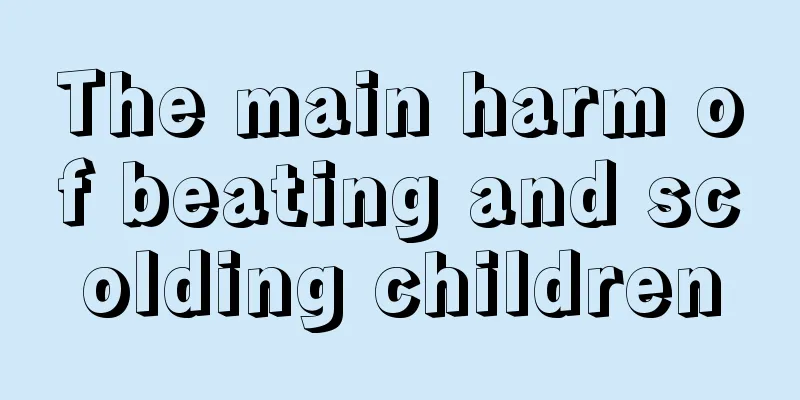Symptoms of mental retardation

|
The healthy growth of children is the greatest wish of parents. The basis for the healthy growth of children is the normal development of the body. The most common problem is developmental delay. Children's developmental delay can be manifested in many aspects, such as physical, intellectual, and mental. Each delay has its own characteristics and is not easy to detect. We need to understand the symptoms. So, what are the symptoms of mental retardation? Let’s take a look below. 1. Classification Regardless of the cause, it is divided into 4 levels based on the level of intellectual disability and the degree of social adaptability impairment.(1) Mild: IQ is 50-69 (accounting for 80%-85%). It is not easy to be detected in the early stage. In infancy, language and motor function development may be delayed, and there are no obvious abnormalities in the development of the body and nervous system. During school age, learning difficulties may gradually appear. Although language development is slightly delayed, social language is still acceptable, and the child can still take care of himself and engage in simple labor and technical operations. Difficulty calculating, reading, writing, applying abstract thinking, lack of flexibility and dependence on others. In terms of personality traits, there are mainly stable type (stable type) and unstable type (excitable type). (2) Moderate: IQ is 35-49 (accounting for 10%-20%), language and motor function development is significantly delayed, they can learn to speak in the preschool period, but cannot express more complex content, and often play with children who are significantly younger than their peers. They have poor learning ability and rarely make it to the third grade. They have difficulty taking care of themselves and need care from others. Some of them have physical developmental defects and abnormal neurological characteristics.(3) Severe: IQ is 20-34 (within 10%), with physical and nervous system abnormalities found since childhood, poor motor and language skills, special facial features, learning difficulties, poor comprehension ability, often accompanied by epilepsy, congenital malformations and abnormal signs of the nervous system. (4) Extremely severe: IQ is below 20, with obvious physical deformities and neurological abnormalities at birth. Generally, the child cannot learn to walk and talk, has poor comprehension, lacks the ability to take care of himself, and is completely dependent on others.
(1) The child begins to smile very late, does not pay attention to what others say, and has delayed motor development. (2) Eye function is underdeveloped, and because the child does not focus on the surrounding area, he is often misdiagnosed as blind. (3) Due to the lack of response to sound, it is often misdiagnosed as deafness. (4) Feeding is difficult due to late chewing. When solid food is given, swallowing disorders occur and vomiting may occur. (5) After a normal child learns to walk, his feet no longer bump into each other when he walks. However, after a child with developmental delay learns to walk, his feet bump into each other, and this may still be seen when the child is 2 to 3 years old. (6) The hand-playing action persists. Normal children often lie on the bed looking at their hands and playing with them repeatedly when they are 3 to 4 months old; children with mental retardation still have the above behaviors after 6 months. (7) Normal children often put things in their mouths when they are 6 to 12 months old, but they no longer do this when their hand movements become more skilled. Children with developmental delays continue to use their mouths, and sometimes put building blocks in their mouths until they are 2 to 3 years old. (8) Normal children will stop intentionally throwing things on the ground at 15 to 16 months old, but children with developmental delays will continue to do so for a longer time. (9) Normal children stop drooling at around 1 year old, but it takes longer for children with defects. (10) When awake, children with intellectual disabilities can be seen grinding their teeth, which is not the case with normal children. (11) Children with intellectual disabilities sometimes need repeated or continuous stimulation to induce crying. They often make guttural sounds and cry sharply, or in a screaming or high-pitched manner. Sometimes their cries are weak. The crying of a normal child often has changes in pitch. (12) Lack of interest and lack of concentration are two very important characteristics of children with intellectual disabilities. Lack of interest is manifested in lack of interest in surrounding things, short-lived interest in toys, and slow response. Children with mental retardation often show excessive sleep and aimless hyperactivity when they are young. |
<<: Infant and child development at different stages
>>: 8-month-old baby development indicators
Recommend
How to treat cold in children
There are many types of colds at present, and the...
Why does a newborn baby cry even though he is full?
Newborns cannot eat when they first come into thi...
Is it okay for a six-year-old to learn street dance?
We often see street dance competitions in univers...
What are the benefits of children's electric toothbrushes
Nowadays, an ordinary toothbrush may be used for ...
What is the cause of foam in the child's urine?
Some people have abnormal urine, so they need to ...
Children have yellow eye mucus due to inflammation of the eyes
Many parents feel that children’s problems are ne...
What are the disadvantages of children staying up late
Staying up late is a behavior that many people do...
What should I do if my baby has a fever and convulsions?
It is normal for parents to worry about their chi...
How many times a day does a 10 month old baby urinate
The frequency of urination is closely related to ...
What time is best for children to go to bed at night?
Nowadays, many young parents are prone to late sl...
What should children eat to reduce fever quickly?
It is very common for children to catch a cold an...
How many months does it take for a baby to stand?
Children cannot talk or walk after they are born....
What is normal stool like for babies?
Usually parents always observe their children'...
Black spots on your child’s teeth?
Generally speaking, when babies start to grow tee...
What should I do if my baby has diarrhea after vaccination?
Every baby needs vaccinations. Although many epid...









